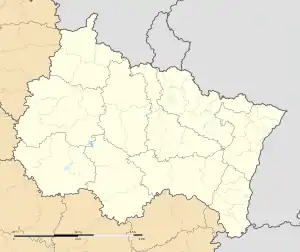Hinsingen
Hinsínge | |
|---|---|
.svg.png.webp) Coat of arms | |
Location of Hinsingen | |
 Hinsingen  Hinsingen | |
| Coordinates: 48°57′12″N 6°59′33″E / 48.9533°N 6.9925°E | |
| Country | France |
| Region | Grand Est |
| Department | Bas-Rhin |
| Arrondissement | Saverne |
| Canton | Ingwiller |
| Government | |
| • Mayor (2020–2026) | Frédéric Bellott[1] |
| Area 1 | 2.98 km2 (1.15 sq mi) |
| Population | 81 |
| • Density | 27/km2 (70/sq mi) |
| Time zone | UTC+01:00 (CET) |
| • Summer (DST) | UTC+02:00 (CEST) |
| INSEE/Postal code | 67199 /67260 |
| Elevation | 212–251 m (696–823 ft) |
| 1 French Land Register data, which excludes lakes, ponds, glaciers > 1 km2 (0.386 sq mi or 247 acres) and river estuaries. | |
Hinsingen (French pronunciation: [insiŋ(ɡ)ən]) is a commune in the north-western corner of the Bas-Rhin department in Grand Est in north-eastern France.[3]
History
The place is first recorded in 1328 as "Heyngesingen": at that time it was in Saarwerden County. Originally the little village clustered around its castle was positioned in the valley, but it was destroyed in the Thirty Years War. Hinsingen is on the frontier between Alsace and Lorraine: following further sustained destruction wrought by the interminable wars fought between France and The Empire in the final decades of the seventeenth century, remaining villagers removed the settlement to its present hilltop location.
The name of the village has mutated over time through "Hinquezange" to "Hinsingen".
See also
References
- ↑ "Répertoire national des élus: les maires" (in French). data.gouv.fr, Plateforme ouverte des données publiques françaises. 13 September 2022.
- ↑ "Populations légales 2021". The National Institute of Statistics and Economic Studies. 28 December 2023.
- ↑ INSEE commune file